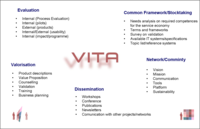- WP1 Stocktaking
- WP2 Validation system
- WP3 ICT Development
- WP4 Piloting
- WP5 Certification
- WP6 Training
- WP7 Evaluation
- WP8 Product Finalisation
- WP9 Dissemination
- WP10 Valorisation
 This project (519132-LLP-1-2011-1-DE-KA3-KA3MP) has been funded with support from the European Commission. This communication reflects the views only of the author, and the Commission cannot be held responsible for any use which may be made of the information contained therein.
This project (519132-LLP-1-2011-1-DE-KA3-KA3MP) has been funded with support from the European Commission. This communication reflects the views only of the author, and the Commission cannot be held responsible for any use which may be made of the information contained therein.
WP1 Outcomes
Below, results and deliverables can be downloaded:
VITA Framework
VITA Needs Analysis
WP 1: Ground works and Stocktaking
- Research Framework and an initial desk resaerch on service related competences
- Online Questionnaires
- A Needs Analysis based on the outcomes of the questionnaire
- The VITA Survey comprising all aforementioned outputs
VITA launched two online surveys to investigate the demands of different learners’ targets groups and educational sectors for validation, on the one hand, the demand for evaluation and evidencing personal and social competence development in different business sectors, on the other hand. The results underpin that is a high appreciation and relevance seen for SPOC in regard to delivering good services, also the need for assessment and evidencing is clearly seen by most respondents. In contrast to this the availability of suitable methods seems to be limited and scattered. Also a lack of time seems to play a very important role when people deal with assessing and evidencing SPOC.
The main findings of the VITA online survey at a glance:
- Social and personal competences are considered being important for the service economy by an overwhelming majority of respondents.
- Communication was ranked being the most important competence followed already by a personal competence (flexibility). However all proposed competences received high scores.
- There is a high interest of assessing and evidencing SPOC; however it must be efficient and adapted to the needs.
- There are two main purposes of assessing and evidencing:
- Improving the teaching/training performance;
- Improving the chances of the learners by evidencing their SPOC;
- The respondents clearly voted for a formative approach since self-assessment, partly in combination with external/staff assessment was predominantly selected as assessment approach.
To substantiate the findings and add more qualitative parameters to the analysis VITA partners conducted interviews in all educational sectors. The interviews reflect of course only a part of the full scope of stakeholders and opinions in the different educational sectors. However, there are some very strong similarities, on the one hand, and sector specifications, on the other hand.
Generally, social, personal and organisational competences are considered very important. They play an increasingly important role not only for the service economy but also in all four educational sectors covered by the LLP. What is missing in all the sectors – and mainly all interviewees stated this – are validation approaches for SPOC. However, they must be fit for purpose, contextualised, customised and not time consuming or even time saving.
A second series of interviews was carried out that addressed representatives of national or regional employment agencies in four of the partner countries. The aim was to gather additional feedback on the relevance of SPOC from the employers’ perspective and in regard to validation methods known to and applied by the agencies. These interviews confirmed the findings: All experts agreed that SPOC are very relevant to employers. Their expectations in this regard are often already named in the job offer. Having an idea of the portfolio of applicants helps them predict the perspectives an applicant may have in the enterprise and foresee in which other areas this person could be working. “Personal competences are seen as a mirror that reflects his/her possibilities to work and „grow“ in the organization“(E. Ožeškienės, LT).

